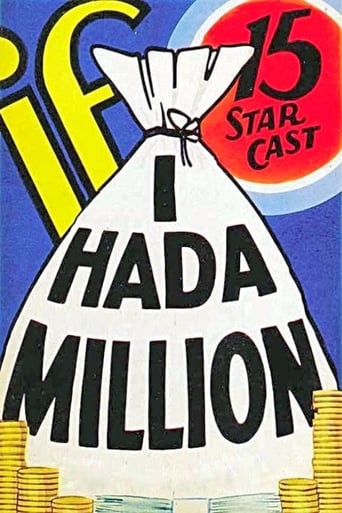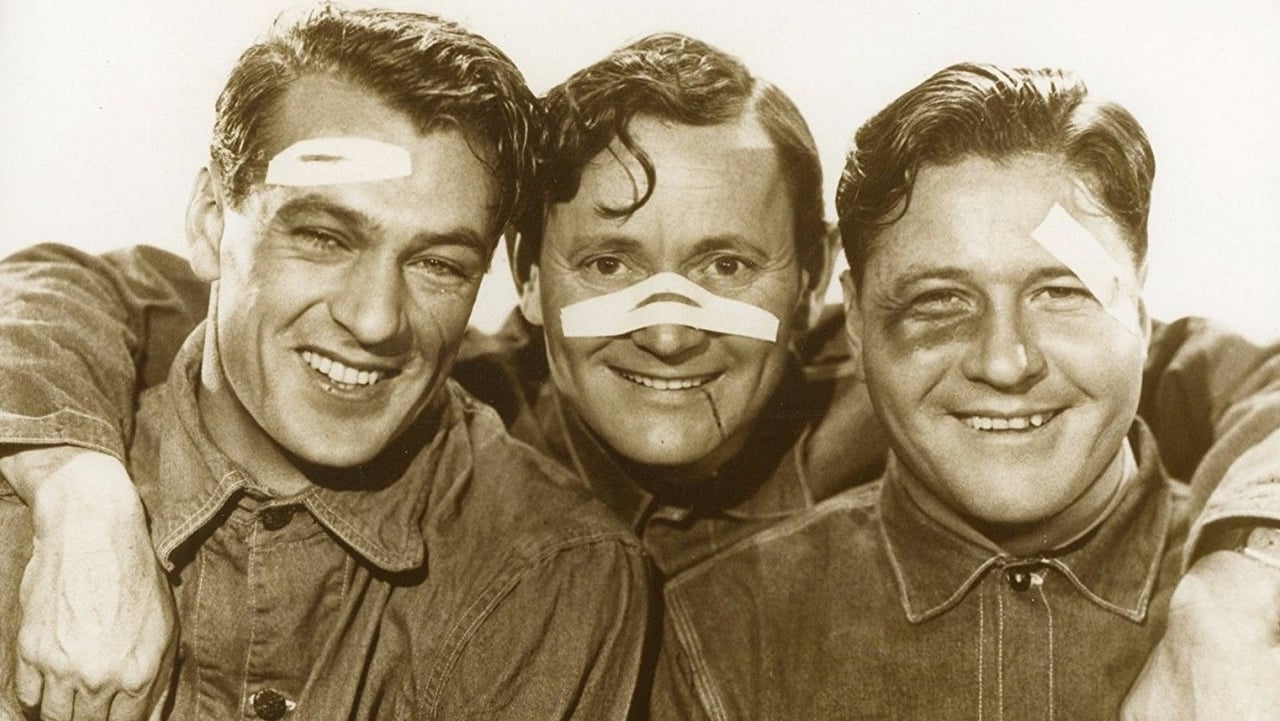writers_reign
An early example of the pantechnicon entry this has dated badly but I accept that had I seen it in a movie theatre closer to the time it was released (32' 33'?) as many writing here seem to have done I may be more sympathetic. I have probably been frightened by other superior examples of the genre, Julien Duvivier's Un Carnet de bal especially, this was only four years after Million but in style and quality it is light years ahead. In the next decade England weighed in with Dead Of Night and two adaptations - Quartet/Trio - of short stories by Willie Maugham (a third, Encore, arrived in 1950), plus Easy Money and Train Of Events. Alas, there isn't much one can say about If I Had A Million but I'm glad I finally got round to seeing it.
ptb-8
What a terrific 1932 film! Paramount's expensive depression comedy drama is one of the very best films made in the '30s and both a poignant and hilarious look at life in 1932 America. If you saw 42ND STREET and American MADNESS and perhaps THE KID FROM SPAIN all made the same year, you would have possibly the definitive early 30s films that allow as full a view of emotions and community as could be found. The cast is astonishing.. all the Paramount A- level stars, 8 of the best directors and 8 truly inspired vignettes present a balanced view of ordinary people 'winning a million dollars'... and their next move. My personal favorite was the prostitute who just wanted a good night's sleep, unmolested, and in a clean bed. The production values are huge, massive sets and elaborate scenes, especially the short one with Charles Laughton... the attention to detail and the fully realized settings are indicative of a very expensive film. All 8 scenes are terrific, not a slouch among them, and the final sequence in the old ladies home is particularly touching. George Raft's con man sequence and Gene Raymond's electric chair scenes are real eyeopeners given the irony involved. IF I HAD A MILLION is a film to find and celebrate. How amazing to have seen this in a 3000 seat cinema in 1932! imagine the cheering from the audience in the comedy scenes! What a crowd pleaser. In Australia this film ran prime time Saturday night 8.30pm on Nationwide free to air TV, such is its treasured reputation. It scored a ratings hit. True! check The TV guides here for ABC2 Saturday night Nov 1st 2009 if you do not believe me.
tedg
The thirties had more experiments in exploring genres than any other time. One of those was the episode genre. It has become only a curiosity in later years because a great many films (and most comedies) are just a series of episodes loosely connected.In this case, the connection is a millionaire who gives money to strangers. The idea was repeated in "Easy Money," to better overall effect. And it got the full dramatic treatment in the long running TeeVee show of the fifties named "The Millionaire."I can recommend this for only two reasons. The first is a comic episode starring W C Fields and car crashes. I think his humor is pretty intelligent because it is so vocal. Oh, he does cinematic things, but it is all wrapped around vocal nuance. Fields and his "wife" here were doing another movie together and hopped over here it seems.The second reason to watch this is Mankiewicz. If you are interested in movies, you must be interested in how they became to be what they are. And that means following the great writers: Sturgis, the Mankiewicz brothers, and others.He seems to have had a hand in a few of these episodes, but the one that is most clearly his is one in which a floozie, Violet Smith, gets her million. It is very short with three tiny acts. She gets the money and has ordinary reactions. She is approached by an oafish sailor for sex. He has one of the most disturbing faces I recall this short of Italian movies. She cozies to him by instinct, so warm and natural that it seems a better act than the actress we have seem so far. Then she realizes she doesn't have to have sex with this guy to survive. It is a simple turn, but done well. And she isn't even credited!The final act is the piece worth watching, though. terrific writing. It is simple. She checks into a fine hotel and gets the finest room. The scene is all about the bed, getting into bed alone, with fine, clean sheets on her. The whole point is that she is alone, with no sexual attentions. At peace.The scene consists of her reveling in her privacy. She takes most of her clothes off so she can feel the sheets. The whole scene takes no more than two minutes. She turns off the light and pulls the sheets over her. Wait! Something is wrong. Light on, sheets off. She realizes she doesn't have to wear her stockings to bed. Now this is great writing folks. She takes them off so can be "off duty" and enjoy the sheets.Now the kicker. All this time we have been invading her space, watching. Leering.Mankiewicz surely understood women in a deep way. I wish we had someone like him today. Garcia perhaps?Ted's Evaluation -- 2 of 3: Has some interesting elements.
theowinthrop
This film was one of those episodic films that occasionally were turned out by studios (Paramount in particular) where each story was only tangentially connected to a running theme. Other examples are O. HENRY'S FULL HOUSE (five of O. Henry's short stories) and WE'RE NOT MARRIED (five stories of couples erroneously married by Victor Moore, before his justice of the peace powers legally began). TALES OF MANHATTAN was another sample of this type of film, using the same man's evening suit as the connecting link between the stories. American films are not the only ones that use this. Somerset Maugham's stories were anthologized in three films: QUARTET, TRIO, and ENCORE in Great Britain, and the classic deja vu horror tale, DEAD OF NIGHT is also episodic.Here the running thread is John Giddens, a wealthy man who is in bad health. Played by stage actor Richard Bennett, Giddens is angry at all the over-attention being given to him by his family and physicians. The latter don't seem to be making him better (but are collecting large fees from him), and the former are actually wondering how soon before he dies so they can read his will. He tells his lawyer that he's tired of all these leeches around him. He decides to give the money away, a million dollars at a time, to total strangers he picks out of the phone book.IF I HAD A MILLION was, actually, the prototype of a popular television series of the 1950s called THE MILLIONAIRE. The idea of THE MILLIONAIRE is basically what is the plot of IF I HAD A MILLION: if somebody plopped a fortune into your hands, what would you do with it? The eight people vary in background and situations. Charlie Ruggles works in a store that sells china. He is very nervous, and his bullying boss and his henpecking wife (Mary Boland, of course), don't help matters. When he gets the check, he demonstrates what he thinks of fancy china and glass to his boss. Similarly downtrodden corporate clerk Charles Laughton is barely noticed by his bosses at his desk job. When he gets the check, and realizes what it means, he goes to the head of the company, and in one moment shows what he feels about being a downtrodden underling. Wynn Gibson uses the money to finally get the good night sleep her normal job has always denied her. W.C. Fields and Allison Skipworth hate road hogs, as their recently purchased new car was destroyed by one. They decide to buy nearly thirty cars to destroy as many of the road pests as possible.George Raft is a professional forger, who thinks this check is the answer to his problems about avoiding arrest. The problem for him is, will anyone cash his perfectly good check. Similarly Gene Raymond is happy to have the money - you see he is on death row, and with the check he can now mount the appeal he needs for a new trial (or can he?).Gary Cooper is a slick soldier who knows all the angles. He and his two buddies figure the check is a phony joke, and they pass it off on a cook they owe money to for hamburgers they charged. Later their laughs disappear when they realize they gave the cook too much of a tip. And best is last: May Robson as an independent old lady who will not put up with the tyranny in an old age home. She not only uses the money to restore the spirit to her fellow old age victims, but she even manages to restore spirit (in the end) to her new friend, Richard Bennett.The film was not all comic - the sequences with Raft and Raymond are actually tragic, and Gibson's success is after a lifetime of unhealthy activity (one hopes her health is good). But it was such a wide variety of stories and reactions to sudden wealth that the film remains a wonderful film experience.


 AD
AD



